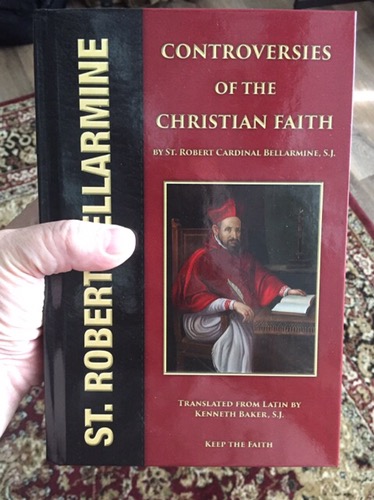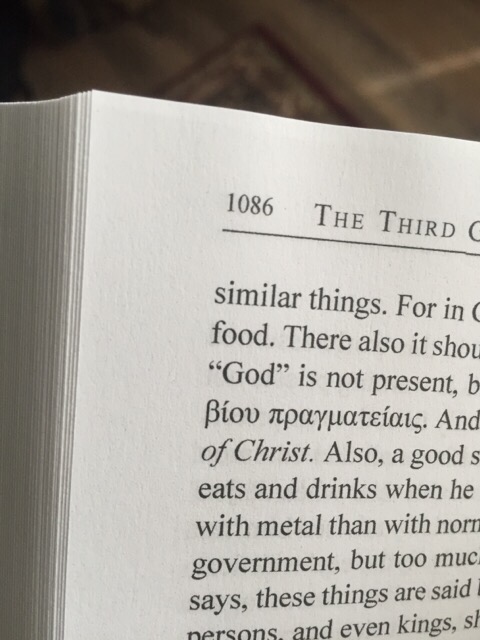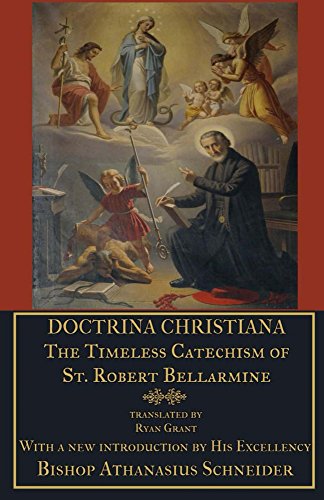Lately I received notice of, and a concrete copy of, newly released English translations of works by the great Doctor of the Church St. Robert Bellarmine (+1621).
St. Robert was a Jesuit (a good one), a Cardinal, theology and profession and rector at the Roman College, archbishop of Capua, He was a major figure in the implementation of the Council of Trent and in the Counter-Reformation. He also took a major role in the matters of Giordano Bruno and Galileo Galilei. He was a splendid teacher in difficult times who refuted errors much like those we see cropping up in the Church today.
He was a prolific writer, but a great deal of his work has not yet been translated into English. Lately, there have been good efforts to do just that. One of those efforts has left me a bit in awe.
First, behold Controversies of the Christian Faith translated by the erst-while of Homiletic and Pastoral Review Fr. Kenneth Baker, SJ. US HERE – UK [didn’t find it yet]
It’s hardcover only, I believe. But… look at the size of this thing!
The pages, from fairly subtle paper, are jammed with text.
“But Father! But Father!”, you terrified liberals are quaking, “Ho… ho… how long is this book?!? How many pages of so-called ‘sound teaching’ are there? If you are happy about this book, it must be rigid and ossified and … and… AGAINST VATICAN II! JUST LIKE YOU!”
To which I respond: Tremble, heretics, women’s ordination fans, and Fishwrap schismatics.
Seriously, I am in awe of the discipline it took to translate this opus magnum.
It begins with a Forward and a brief life of the saint. Fr. Baker says that he did it in a year. Holy cow.
 Next, available also on Kindle (don’t have a Kindle yet? US HERE – UK HERE), Doctrina Christiana: The Timeless Catechism of St. Robert Bellarmine translated by Ryan Grant with an introduction by the great Bp. Athanasius Schneider. US HERE – UK HERE
Next, available also on Kindle (don’t have a Kindle yet? US HERE – UK HERE), Doctrina Christiana: The Timeless Catechism of St. Robert Bellarmine translated by Ryan Grant with an introduction by the great Bp. Athanasius Schneider. US HERE – UK HERE
A while back I posted an entry with suggestions for different catechisms. I think this should be on the list. This takes the form of a dialogue, rather than simply prose explications of bullet points.
In the forward we read:
In our time of an enormous and general confusion in matters of Catholic faith we do need urgently a crystal-clear, absolute reliable and at the same time simple catechetical text. Such a text represents the famous catechism of St. Robert Bellarmine, which notwithstanding being written 400 years ago, remains nevertheless up to date. This catechism had until the 20th century about 400 editions and has been translated into 60 languages. It was a favorite catechetical tool for the missionaries in the past centuries.
The countries of the so-called Western civilization became today almost neopagan societies and there are even people who named themselves Catholics but are living like pagans. It is therefore obvious that we are living in a missionary. Both inside and outside the church.
The translator adds these interesting notes, which make reference to the first work by Bellarmine with which I started this entry, above:
St. Robert Bellarmine composed two catechisms under the title of Doctrina Christiana(Christian Doctrine), one called his “Small Catechism” which he had written for children and simple souls. This second one, written as a dialogue, called his “Long Catechism,” was intended for teachers and for the well instructed to deepen their understanding of the truths of the faith. The Shorter Catechism was translated in 1614, but the Long, at least to our knowledge, had never been rendered into English until now.
The translation was made from the Latin edition published in Prague in 1732. It seemed to be the most accurate, and it was compiled and edited into a text version book by Anton Repko, whom I especially thank as many of the copies available in electronic form have defects, missing pages etc. Still, as sometimes the Latin edition used complicated phrases from 16th century vernacular Latin that simply would not render into English well, it was necessary to consult Bellarmine’s original Italian to simplify.
This Catechism was written at the express command of Pope Clement VIII, and approved by him in 1598. It quickly became more popular than the Saint’s Controversies, which he is principally known for today. It was also specifically approved by Pope Benedict XIV, and its importance was so great that Pius XI, in his bull of canonization for the Saint, declared of this Catechism:
“Nor may we pass over in silence his sacred sermons and also his catechetical works, especially that catechism, which the use of the ages as well as the judgment of a great many bishops and doctors of the church has approved. Indeed, in that same catechism, composed at the command of Clement eight, the illustrious holy theologian expounded for the use of the Christian people and especially of children, the Catholic truth in a plain style, so brilliantly, exactly and orderly that for nearly three centuries in many regions of Europe and the world, it most fruitfully provided the fodder of Christian doctrine to the faithful.”
In his introduction, the great Bp. Schneider penned, and we cannot but agree:
The corruption of morals and depravity of life is already so great, and ever increasingly greater, not only among uncivilized peoples but even in those very nations that are called Christian. The Apostle Paul, writing to the Ephesians, repeatedly admonished them in these words: “But immorality and every uncleanness or covetousness, let it not even be named among you, as become saints; or obscenity or foolish talk” (Eph. 5:34). He also places the foundation of holiness and sound morals upon a knowledge of divine things—which holds in check evil desires: “See to it therefore, brethren, that you walk with care: not as unwise but as wise. . . Therefore, do not become foolish, but understand what the will of the Lord is” (Eph. 5:15-16).” (Encyclical Acerbo nimis from April 15, 1905).
A good and solid knowledge of the Catholic faith has as its aim a virtuous life through which alone with the help of God’s grace one can achieve eternal salvation. Saint Pius X teaches therefore: “Christian teaching not only bestows on the intellect the light by which attains truth, but from it our will draws that ardor by which we are raised up to God and joined with Him in the practice of virtue” (Encyclical Acerbo nimis from April 15, 1905).
The true knowledge of the Catholic faith fills the human mind with a light and this light, in spite of being sometimes obfuscated by a bad will, is usually the effective means of salvation.
The content of our Catholic Faith is not just words and formulae to be memorized. The true, interior content of the Faith is a Person, the divine Person of the Eternal Word made Flesh, Christ Jesus. We can have a relationship with a Person. Coming to know the Faith leads to knowledge of Christ and, in turn, hope and love. Furthermore, as the bishop pointed out, even if one loses love, that is charity, and loses hope, faith remains long after. That faith can help to bring you back to hope and to charity.
I am delighted that these good resources are being made available. Perhaps some of their clearly counter-reformation spirit can be spread through their acquisition and use.







































The readaholic in me goggles at the depth of Father Baker’s work. But I have already ordered Mr. Grant’s translation, so I’ll have to wait on Controversies of the Christian Faith. Thank you Father.
Thank you for telling us about these! They are very welcome (and the Controversies does indeed seem as astonishing achievement)!
I have never had much luck finding works of his online in English translation. The Internet Archive has scans of only a handful.
One is the very 1614 Shorter Catechism mentioned here, and delightfully full of illustrations, listed as: A Shorte Catechisme of Card.all Bellarmine Illustrated with the Images
Curiously, there does also seem to be an earlier translation – much earlier! (by Dr. Richard Hadock) – of the Long Catechism translated here, which it might interest industrious readers to do a bit of comparing with. It is listed as: An Ample Declaration of the Christian Doctrine
Another work has two English translations, the first from 1638 as: Of the Eternal Felicity of the Saints
The second, from 1710, by a clergyman of the Church of England, listed as: Ouranography: or Heaven opened. The substance of Cardinal Bellarmine’s five books concerning the eternal felicity of the saints
Another is from 1638, including a life of nearly 100 pages from 1621: The Art of Dying Well
Finally, there is a translation of De ascensione mentis in Deum per scalas rerum creatorum opusculum (of which Internet Archive also has a 1746 Latin edition) – as it happens, another translation “by as Divine of the Church of England” (who notes he has “omitted a few passages in the original […] relating to Saints and Angels”), listed as: Steps of ascension to God : written originally in Latin by the famous Cardinal Bellarmine
Let us (especially the not very apt Latinists and Italianists among us or our acquaintances) hope there are more new translations to follow!
Fr. Kenneth Baker, SJ. “Holy cow”!
The man is almost 87 years old!
He is a REAL and faithful Jesuit . . . a former editor of “Latin Mass” magazine. Jesuits like him are so sorely needed today. Others like Servant of God Fr. John A. Hardon and Fr James Schall come to mind. They don’t know the meaning of retirement.
They worked their rear ends off writing, preaching, teaching, evangelizing the one, holy, Catholic and apostolic faith until they dropped into bed every night . . . or dropped dead! They make me feel lazy. They are exemplars of what a REAL Jesuit should be. God bless them.
TRIVIA ALERT!
I read somewhere that St Robert was just over 5 feet tall.
And, in his spare time over the last few years, the good Fr. Baker translated all of ‘Summa of Sacred Theology’ (Sacrae Theologiae Summa), approximately 4000 pages of a summary of scholastic and Thomistic theology. These books are also available from Keep the Faith, publishers of the the Latin Mass magazine. Thanks be to God for such an indefatigable member of the Church Militant!
An amazing effort on behalf of my confirmation Saint, whose intercession I pray will restore the Company.
Perhaps it was inadvertant, Fr Z, but the picture you included as closeup (page 1086), while advising “Tremble, heretics, women’s ordination fans, and Fishwrap schismatics.”, contains the following advice regarding being a good soldier of Christ: “…[he] is not anxious about food and the care of the body, but he eats and drinks when he can, and as he can; he sleeps on the ground, he is clothed with more metal than normal clothing, etc.” Being a good soldier of Christ is not for the weak of heart. It is not mealey and soft, but hard, lean, and resolute. Good advice. I look forward to dipping into this book now that I have it in hand!
[It was simply the last page of text in the book. Still, its a great quote. And the “heretics” to whom he refers, are Protestants. But the groups I mentioned fit in with that, don’t they?]
Amazon is out, and I cannot find it anywhere else. The website that keeps turning up when I search for the publisher doesn’t appear promising either.
Any ideas on when more might show up, or where else to find a copy?